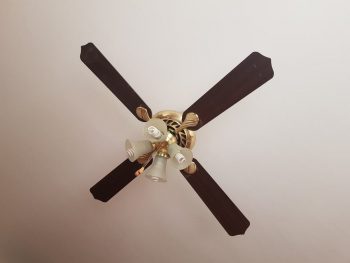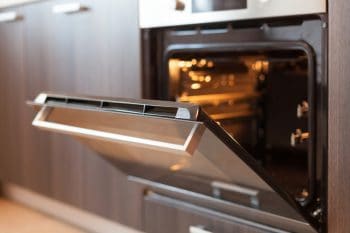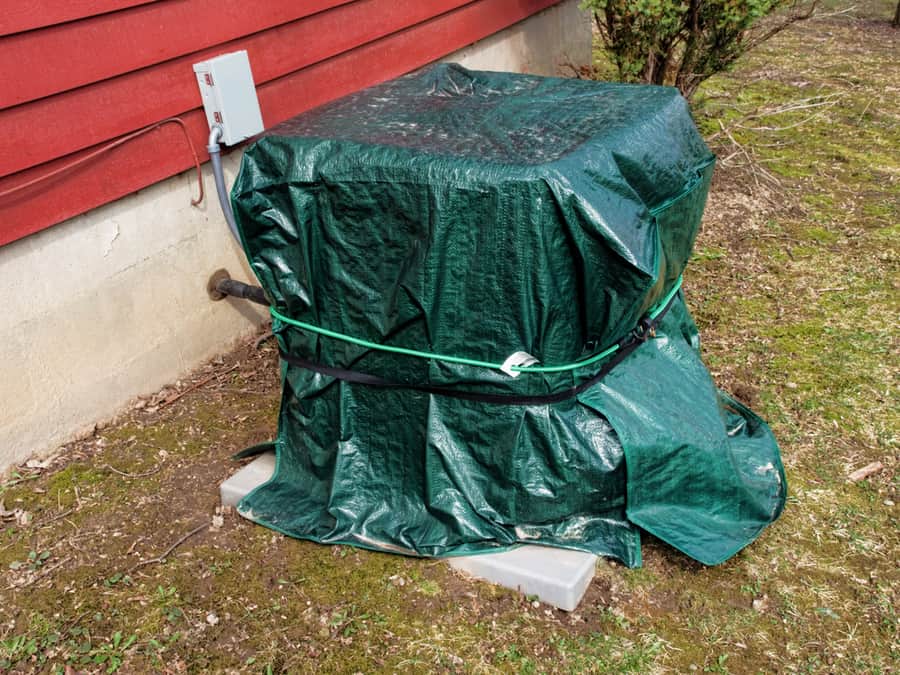
When the winter months come rolling in, you might find yourself in a blizzard of preparation. Everything needs to be winterized – from your car to your gutters.
But what about that giant air conditioning unit sticking out of the side of your home?
Because it’s so exposed to the elements, the AC unit may need added protection from the cold and snow. But before you start boarding it up, you should learn the proper way to do it and whether it’s even necessary.
So how should you cover an air conditioner for the winter?
- Read your manual and strictly adhere to airflow clearance requirements
- Use materials and cover designs that permit proper ventilation
- Whenever possible, provide a cover that shields the unit from both snow and heat
- Protect your unit against flying and falling debris with a breathable enclosure
- Make sure your cover doesn’t restrict maintenance and cleaning accessibility
Interestingly, air conditioners don’t always need to be covered up during the winter. In certain cases, covering the unit might even do more harm than good, especially if executed improperly.
Follow these tips to find out if your AC needs extra protection and how to do it.
Does Your Air Conditioner Need a Cover?
First things first – do your air conditioning unit even need a cover? You’ll be surprised that many HVAC experts recommend against covering an air conditioner even during harsh winter. The reasons include the following:
- AC units are designed so that they don’t need extra protection during winter
- Covering an air conditioner could restrict airflow
- A cover can foster the development of mold and mildew
- Pent-up moisture can lead to corrosion and rust
- An enclosed AC unit might attract animals and pests seeking shelter from the cold
There are certain situations, however, when it might help to cover your air conditioner. If you anticipate any of the following, then you might have to push through with your plans to create an AC cover:
- A winter storm that could cause damage to your AC with flying debris
- Lots of snow accumulating around the air conditioner, threatening to encase the unit
- Clumps of snow and ice falling on your unit from a considerable height
- Dripping water from trees and gutters could freeze and expand inside the unit
How To Cover Your Air Conditioner for Winter
1. Read the Manual

Before doing anything with a major appliance like an air conditioner, you’ll want to give the manual a skim. Improper handling could cause you to void your warranty. In most cases, the manual will also tell you about proper clearance around the unit to allow maximum airflow.
If your air conditioner cover obstructs airflow and traps the unit too much, condensation and humidity could build up, causing bigger problems for your AC.
If your manual doesn’t specify clearance, try to call an HVAC specialist first.
2. Choose the Right Material
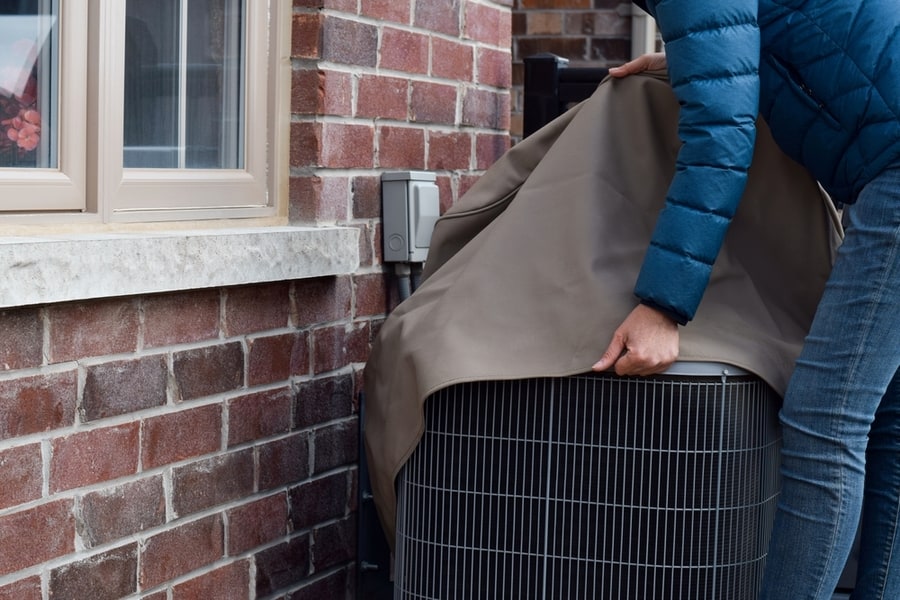
Pay a quick visit to Pinterest, and you’ll find that many homeowners use wood for their air conditioner covers. Others even go as far as having custom metal or wrought iron encasement designs to protect their unit.
Choosing the right material is vital because it determines how well the cover will permit air to continue flowing and circulating despite enclosing your unit. Avoid solid panels that encase the air conditioner and trap stagnant air around the appliance.
Plastic covers might seem accessible and affordable, but they should be avoided at all costs. Plastic tends to trap the most moisture and humidity compared to other materials. This can cause condensation, rust, mold, and mildew to thrive inside the unit.
3. Protect the Important Parts
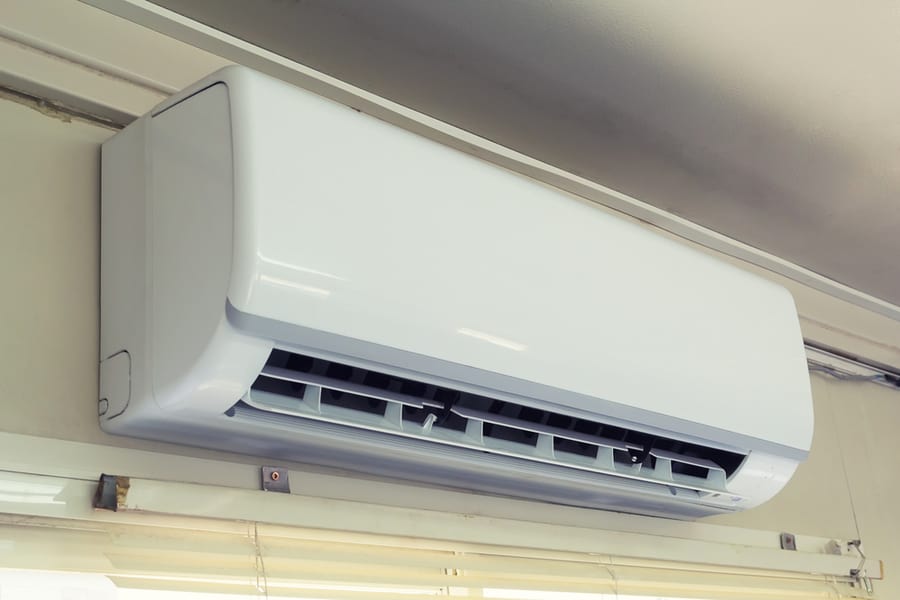
Sometimes, it’s not necessary to enclose the whole unit. Placing a makeshift awning or a sheet of plywood over the air conditioner should provide sufficient protection in the winter and summer.
A sturdy wooden shelter hanging over the unit should keep it properly shaded in the heat and protect it against falling debris and piling snow during the winter.
This is a good solution, especially in areas where snow storms are uncommon.
4. Get Creative With Enclosures
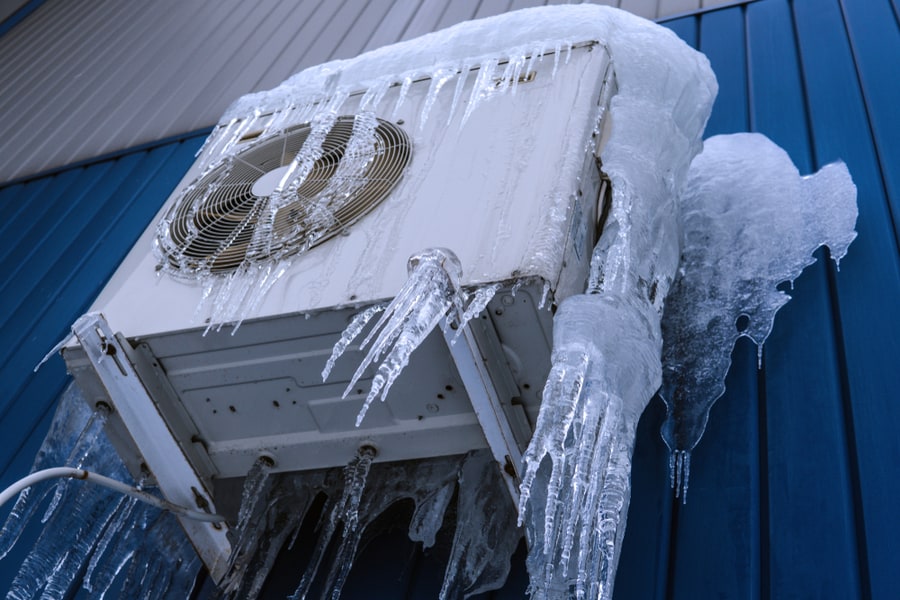
During the winter, the main purpose of the enclosure isn’t to protect against cold but to defend against debris. That’s because air conditioners are designed to function properly even when exposed to freezing temperatures.
You don’t need to create a cover to keep your unit warm. Instead, think of ways to prevent snow, leaves, and other bits from being blown into the unit.
Some homeowners have chosen a wall of shrubs and plants to protect the unit against potentially damaging flying debris.
5. Consider Accessibility

When designing or building a cover or enclosure for your AC unit, consider accessibility. The last thing you’d want is to restrict access to the air conditioner, especially when it’s time for maintenance, repairs, and cleaning.
To keep the unit within reach, some homeowners build covers that can lift away with hinges and enclosures that open up to reveal the entire unit.
Others create removable covers that you can pull away from the AC when it isn’t needed.
Conclusion
Air conditioners don’t need protection from the cold, but there’s no harm in protecting your unit against falling and flying debris. A temporary cover can help shield your unit during snow storms and prevent damage to its parts.
Just follow these steps to create the right kind of cover. By choosing the appropriate material and design, your cover can offer an added layer of protection without affecting your AC’s performance.
Frequently Asked Questions
Is It Okay To Turn On an Air Conditioner During the Winter?
You won’t find a reason to turn your air conditioner on in the winter. But just in case you were wondering, most manufacturers recommend against turning on AC units when outdoor temperatures dip below 59°F.
Doing so could damage the unit’s internal workings and may cause major issues in the summer when you finally find the need to keep it running.
Can an Air Conditioner Freeze in the Winter?
Yes, it’s possible, but only if your unit wasn’t in good condition in the first place. Before winter settles in, change the air filters and maintain proper refrigerant levels.
Call an HVAC specialist to check refrigerant leaks and repair your AC to protect it during the winter.



